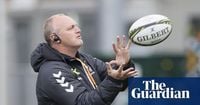England rugby fans have seen a revolving door of attack coaches over the past decade, but the appointment of Lee Blackett as the latest man in charge of the team’s offensive strategy is already making waves. At 42, Blackett steps into the role as England’s 11th attack coach since 2016, and he’s convinced he’s got the time and tools to transform the side’s fortunes ahead of the 2027 Rugby World Cup in Australia. With the autumn series opener against the Wallabies at Twickenham’s Allianz Stadium on November 1, 2025, just around the corner, all eyes are on how Blackett’s influence will shape England’s next chapter.
Blackett’s journey to the England coaching staff is a story of resilience and innovation. Fresh off a successful stint at Bath, where he helped secure Premiership and Challenge Cup titles, Blackett’s stock rose even further after a triumphant summer 2025 tour with England to Argentina and the USA. Filling in as a temporary attack coach while Richard Wigglesworth was on British and Irish Lions duty, Blackett oversaw a thrilling run that saw England rack up 13 tries in just three Tests. That attacking verve didn’t go unnoticed, and Steve Borthwick was quick to make Blackett’s position permanent as part of a broader shake-up of his coaching cabinet.
“Do I think we’ve got enough time? Yes,” Blackett confidently declared, reflecting on the five campaigns—autumn internationals, Six Nations, and summer Tests—that separate England from the next World Cup. “Five campaigns is enough to see people, it’s enough to develop our game, definitely.” For a team that’s often been accused of lacking consistency in attack, Blackett’s clarity and optimism are a breath of fresh air.
But the new coach isn’t just about planning for the distant future. Blackett is laser-focused on the here and now, particularly the looming clash with Australia. “Momentum’s massive in sport, and especially at the start of campaigns and so we are talking about Australia. If you’re thinking too far ahead, all of a sudden momentum can go,” he warned. “How many teams have you seen lose momentum in the start? You never get it back. And in international rugby, because you’ve got four games in the autumn and the Six Nations, you have to get off to a flying start. So Australia is massive.”
England’s preparations ramped up in mid-September with a three-day familiarisation camp in Surrey, bringing together 36 players for a crucial early look at the squad’s dynamics. Notably, Blackett had no hand in selecting the squad for this camp, but his presence was felt as he began to lay the groundwork for his attacking philosophy. The camp also served as a barometer for the team’s fitness, with several key players rehabbing injuries—including Tom Curry, Elliot Daly, Immanuel Feyi-Waboso, and Will Stuart—while captain Maro Itoje, managing a concussion from the Lions’ final Test against Australia in August, attended but did not participate in field sessions.
One of the biggest talking points ahead of the autumn series is the battle for the fly-half jersey. With Owen Farrell, a stalwart of English rugby, omitted from the 36-man squad and overlooked for an elite player contract despite his return to Saracens, the door has swung wide open for new contenders. George Ford, Fin Smith, and Marcus Smith are now locked in a three-way shootout for the coveted number 10 shirt. Blackett is relishing the competition, stating, “Any attack coach or head coach always wants one key thing: make sure you’ve got good 10s because they make such a big difference. We’re really lucky because I think everyone on the outside is looking at our 10s and saying ‘look how many they’ve got and the quality they’ve got’. There are three in this squad so a couple of them are going to be disappointed. But with the three of them competing, it’s going to make them better. They’re all going to have to be at their best.”
Blackett’s approach isn’t about flashy rugby for its own sake. He’s clear that his priority is winning. “I’ll be doing whatever I feel is best to win us the game. I’ll be looking at the opposition and where I feel we can get an advantage. If you think that’s funky … I just want something that works to win us the game.” This pragmatic, results-driven attitude is paired with an emphasis on building player confidence. In his own words, “I want players running out confident, I want players running out there going, ‘If I see something, this coach backs me.’ I don’t want us to miss opportunities when they are there for us.”
England’s squad reflects both youth and experience. Maro Itoje, at 30, remains the heartbeat of the team, though his immediate participation is uncertain due to concussion protocols. George Martin’s anticipated return from injury could prove pivotal in the second row, while Ollie Chessum and Tom Curry continue to anchor a formidable back row. Ben Earl’s pace and energy keep him in the mix, though Tom Willis is pushing hard for a spot. On the bench, Luke Cowan-Dickie, Fin Baxter, Joe Heyes, Chandler Cunningham-South, and Ben Curry are poised to bring impact, with Jack van Poortvliet providing control at scrum-half.
The backline options are equally intriguing. Fin Smith’s rapid development has seen him slot into the 23, applying pressure on Marcus Smith, while Elliot Daly’s versatility across centre, wing, and fullback gives Borthwick valuable flexibility. The omission of Owen Farrell is perhaps the clearest signal yet that England is moving towards a new era in leadership and style, as the team looks to blend fresh attacking ideas with the grit and discipline that have long been its hallmarks.
Blackett’s arrival comes at a critical juncture for English rugby. The team’s history of cycling through attack coaches—Eddie Jones, Glen Ella, Ed Robinson, Sam Vesty, Scott Wisemantel, Rory Teague, Simon Amor, Martin Gleeson, Nick Evans, and Richard Wigglesworth have all had their turn in recent years—has left fans yearning for stability and a clear direction. If Blackett can bring the same creative spark and adaptability that revitalized Bath, England may finally have found the catalyst they’ve been searching for.
With the autumn series opener against Australia fast approaching and a new coaching team in place, anticipation is building. The competition for places is fierce, the tactical approach is evolving, and Blackett’s belief in the squad’s potential is infectious. As England embarks on this new campaign, supporters will be watching closely to see whether this latest chapter marks the beginning of a genuine resurgence—or just another twist in the ongoing saga of English rugby’s search for attacking excellence.


